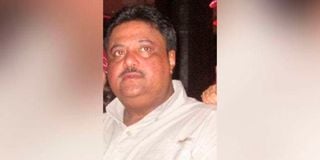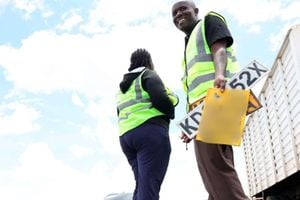Asif Hafeez, suspect in Akasha drugs case, extradited to the US

Mr Asif Hafeez, 63, who was extradited to the United States after being linked to the Akasha brothers’ drugs saga.
The United States of America (USA) finally managed to extradite Mr Asif Hafeez, a Pakistan national, from Belmarsh Prison in Britain to New York, the Saturday Nation can now reveal.
Mr Hafeez, 63, has for years been linked to the Akasha brothers from Kenya, who are now jailed in the US for drug trafficking.
Mr Hafeez is believed to have been a main player in the manufacture and sneaking of drugs to the US, where authorities have said he is variously known as the “big boss”, “the Sultan” and the “number one in the world” for heroin and hashish smuggling.
In an exclusive interview, Mr Syed Khurram, the lawyer representing Mr Hafeez, said his client was on Friday, May 12, 2023, picked up by officers attached to the Federal Bureau of Investigations (FBI) and silently extradited to the US from Britain.
It was a matter of when, not if, Mr Hafeez would be deported to the US as he kept on fighting his extradition in court, arguing that American authorities were not up to any good with their efforts to have him flown out of London.
“Yes, he was extradited to the US on May 12, 2023. All I know is that he was not aware when they were planning to do it but all he knew was that he would end up in New York,” Mr Khurram told the Saturday Nation on phone from London, where he is based.
The lawyer further said Mr Hafeez asked his lawyers to stop following up on his extradition case, saying he was exhausted and ready to face the US authorities and argue his case out.
Asked to comment on the manner of the arrest, Mr Khurram said he was picked silently by FBI officers and no-one “misbehaved” or “gave them a hard time”.
Mr Hafeez, an inmate since 2017, may be asked to shed light on Kenya and South Africa’s drug trade and its key players, as he allegedly worked closely with the Akasha brothers.
In an earlier exclusive interview, Mr Hafeez said he interacted with the Akasha brothers for the first time in 1988, when he visited Kenya.
“I visited Kenya in 1988 when my brother had a baby, which is when I first and last interacted with the Akasha brothers. Since then, I never had any interactions with them until Mr Goswami started raising allegations against me,” he said, adding that he rubbed the US the wrong way when he refused to work for them in a case targeting drug lords, including Mr Dawood Ibrahim.
Ever since he was arrested in the UK in 2017, Mr Hafeez had had a hard time as he remained strictly behind bars, from where he engaged lawyers in a bid to secure his freedom.
Keen to avoid being sent to the US, he even turned to the European Court of Human Rights (ECHR), where his lawyers raised issues about his health and what they termed poor US prison conditions.
However, on April 20, 2023, the ECHR dismissed the case in which he was looking to avert his extradition to the US.
In his application, Mr Hafeez argued that he once worked as an informant for the FBI in the US and that he feared being subjected to more suffering on US soil.
“The US government did not consider him an informant and therefore he could not take advantage of a status which he did not have,” the ECHR said in its ruling, adding Mr Hafeez had brought to the attention of the authorities the criminal conduct of others who he knew to be actual or potential rivals to his substantial criminal enterprise.
However, his family feel his extradition was illegal, as they were planning to file an application through his lawyer at the ECHR and at the Citizen Commission on Human Rights (CCHR).
The CCHR is a nonprofit mental health watchdog that protects individuals from abusive or coercive practices.
The family further revealed that his other lawyer, Mr Emmanuel Ruchat, was preparing a revised application to the ECHR and that his team of lawyers in the UK had, on April 28, 2023, also penned a letter to the Crown Prosecution Service (CPS) to notify them of the revision application.
“It is clear that he was denied justice and he had been extradited illegally. Upon receiving a negative response from the UK authorities, Hafeez’s European attorney prepared an application and the ECHR allowed time to submit a full application until May 26, 2023, but he was picked up before the deadline,” a family member told a Pakistan media house.
In 2014, agents from the Drug Enforcement Administration (DEA), a US federal law enforcement agency under the US Department of Justice that is tasked with combating drug trafficking and distribution within the US, started investigations, during which Mr Hafeez was widely mentioned.
“He knew the substance would be unlawfully imported into the US and into waters within a distance of 12 miles off the Coast of the US from a place outside therefore, was one kilogram and more of mixtures and substances containing heroin, in violation of Title 21, US code section 960(b)(1)(A),” the US, through the Department of Justice, said.
He was accused alongside brothers Baktash Akasha Abdalla and Ibrahim Akasha Abdalla, Bollywood star Mamta Kulkarni, the latter’s husband Vicky Goswami and Ghulam Hussein.
The Nation has established that Goswami, an Indian drug lord who has since been arrested and extradited to the US, has been turned into a state witness against Mr Asif, a trained pilot who later turned into a businessman.
Mr Goswami is the only one who has accepted to testify against Mr Hafeez.
The Akasha brothers have refused to indict Mr Hafeez, maintaining that he had no drug dealings with them and that the charges against him are false and fabricated.
But in details he has given to the US authorities, Mr Goswami has linked Mr Hafeez to the Gupta family in a matter revolving around money laundering.
The Guptas are a wealthy Indian-born family “with business interests in South Africa, whose most notable m embers are brothers Ajay, Atul and Rajesh "Tony" Gupta —as well as Atul's nephews Varun, and US-based Ashish and Amol. The family owns a business empire spanning computer equipment, media and mining.”
Owing to his acceptance to testify against not only Mr Asif but also the other co-accused, Kenyan lawyer Cliff Ombeta described Mr Hafeez as an opportunist who threw his comrades under the bus for his own survival.
Mr Ombeta’s words came shortly after the Akasha brothers, who were his clients, were jailed in New York.
He further said that the Indian national “entered Kenya on a forged Indian passport in late 2012 after he served a jail term in a country in the East”.
Mr Baktash was jailed for 25 years and slapped with a fine of Sh10 million while his brother Abdalla was jailed for 23 years after he pleaded guilty of trafficking drugs into the US. This is one of the reasons Mr Ombeta was furious with Mr Goswami.
It is worth noting that US authorities tried to convince the team that was extradited from Kenya to testify against Mr Hafeez, but only Mr Goswami agreed to do so.
The US authorities did not charge Mr Goswami, which clearly shows that he had turned into a witness and an asset who will be assisting in nailing more suspects engaged in the drug business.





